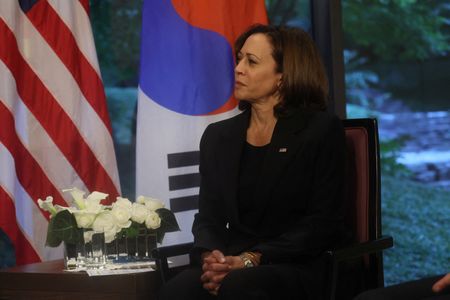By Trevor Hunnicutt
TOKYO (Reuters) -U.S. Vice President Kamala Harris will visit the Demilitarized Zone (DMZ) separating the Koreas on Thursday in a bid to show Washington’s commitment to the South’s security, according to U.S. and South Korean officials.
The visit, announced on Tuesday, comes days after North Korea fired a ballistic missile towards the sea and amid fears of a possible nuclear test as the Biden administration’s attempts at outreach to North Korean leader Kim Jong Un have failed.
Harris’ visit, which would be the first by a senior Biden administration official, was publicly announced by South Korean Prime Minister Han Duck-soo during a meeting with the U.S. vice president in Tokyo and was later confirmed by a U.S. official.
On Monday in New York, the North Korean ambassador to the United Nations, Kim Song, accused Washington of pursuing hostile policies that were causing a “vicious cycle of tension and confrontation.”
A U.S. aircraft carrier is in the area for joint drills with the South Korean navy this week in what Kim called an “extremely dangerous act” that could drive the peninsula to the brink of war.
Harris is in the region to lead a U.S. presidential delegation to the funeral of former Japanese Prime Minister Shinzo Abe on Tuesday.
The DMZ visit will underscore the strength of the alliance between Seoul and Washington “in the face of any threats posed” by North Korea, said the U.S. official, who asked not to be named discussing a trip that Harris has not officially announced.
Harris will tour the DMZ, meet with service members, receive an operational briefing from U.S. commanders, reflect on the shared sacrifice of American and South Korean soldiers and reaffirm the “ironclad” commitment to South Korean security, the official added.
“Your visit to the DMZ and Seoul will be very symbolic demonstrations of your strong commitments to security and peace on the Korean Peninsula,” Han said.
Several former U.S. presidents, and Biden himself before he became president, have visited the DMZ, but former President Donald Trump became the first to have met a North Korean leader there when he held a third meeting with Kim Jong Un in 2019 as part of his unsuccessful effort to persuade Kim to give up his nuclear and missile programs.
The DMZ is often described as the world’s last Cold War frontier and has existed since the 1950-53 Korean War ended in a armistice rather than a peace treaty.
(Reporting by Trevor Hunnicutt; Additional reporting by Chang-Ran Kim and Josh Smith; Editing by Ana Nicolaci da Costa and Jacqueline Wong)





